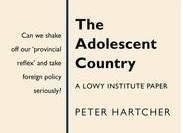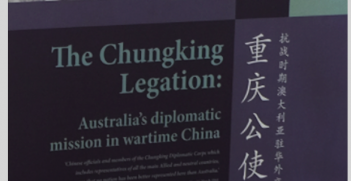The Adolescent Country

In his keynote address to world leaders at the G20 Summit in Brisbane last November, Australia’s Prime Minister, Tony Abbott, chose to complain about the difficulty of getting his domestic budget, including a $7 co-payment for medical patients, through a fractious parliament. World leaders were openly bemused.
In this Lowy Institute essay under review, Peter Hartcher discusses more generally the pathology of parochialism that infects foreign policy debate in Australia. He asserts that when in opposition, Tony Abbott was a particularly ruthless practitioner of the art. Thus Labor’s campaign to get Australia a non-permanent seat on the UN Security Council, and its negotiations with Indonesia over boat people, were not seen in terms of Australia’s responsibilities as a good international citizen, the successful outcomes of which would benefit Australia, but were reduced to the parsimonious ‘cost to the Australian taxpayer’.
Prime Minister Abbott’s parochial affliction, Hartcher asserts, has extended well into his first term as prime minister, and not just at the G20 Summit. Abbott quickly changed his attitude towards the Security Council when Australia won its seat, but continued to stumble badly over Indonesia. His mantra about turning back the boats when it was safe to do so; his proposal to buy up Indonesian fishing boats to keep them out of the hands of people smugglers; and his refusal to apologise for phone-tapping President Susilo Bambang Yudhoyono and his wife: all represented needless bluster and gratuitous insult to the Indonesians.
Not that Abbott has a monopoly on such irresponsibility. From Federation until Australia was more or less forced to open legations in foreign countries in the 1940s, Australian politicians had an aversion to taking any responsibility for foreign policy. It should, they averred, be left to Whitehall. Hartcher argues that even in more recent times, Australian foreign ministers have given their role little gravitas and gives examples from both Labor’s Bob Carr and the Liberals’ Alexander Downer. Both major parties have always assumed that we have more food than we can eat, the highest living standards in the world and a free and stable government with no discernible outside threat or, in any event, protected by the United States.
But, continues Hartcher, this is a false paradise. Australia is the eighth most interconnected country in the world, and Sydney is the twelfth most ‘globally engaged’. Australia needs trade and foreign capital for economic growth and young people to counter the aging of the population.
This interdependency has led to adjustments. In the 1960s, Australia was on the periphery of world affairs, engaging only in Commonwealth Heads of Government meetings and the Pacific Islands Forum. Now Australia has intricate roles to play in regional forums such as APEC and ASEAN. In 2014 Australia played host to the G20, held a seat on the Security Council and received visits by the leaders of significant countries. The Abbott Government has sealed bilateral trade agreements, negotiated by its predecessors for 11 years, with China, Japan and the Republic of Korea. From suspicion of activism which guaranteed underachievement – ‘we shouldn’t have ideas above our station’, or ‘have tickets on ourselves’ – Abbott and his ministers now embrace Australia’s foreign policy prominence with exuberance, calling Australia a ‘top 20 nation’.
According to Michael Thawley, John Howard’s Ambassador to Washington and now the head of the Department of Prime Minister and Cabinet, Australia needs an active international agenda “to shape the behaviour of major powers, to be a strategic price-setter, not a price-taker.”
Hartcher gives examples of what he asserts are robust unilateral foreign policy initiatives by a succession of Australian leaders: Chifley supporting Indonesian independence in 1949; Whitlam’s visit to China in 1971 seven months before Kissinger’s visit that so outraged the conservative McMahon government; Hawke establishing APEC in Seoul in 1989; Peter Costello, then Kevin Rudd, helping to formulate the G20 in 2009; the Abbott Government initiating a UN Security Council resolution to recover the remains of victims of MH17 shot down over the Ukraine.
So far so good. But in a rather curious characterisation, Hartcher praises Abbott’s foreign policy for developing a new relationship with his ‘best friend in Asia’, Japanese Prime Minister Shinzo Abe, and in being the first US ally to send aircraft and ground units into the third Iraq War. In my view, both reveal a deep and abiding compulsion, painfully evident in both Liberal and Labor foreign policies over many years, to continue to pay insurance premiums to the United States for protection. Close friendship with Japan and uncritical support for Abe’s wish to change the Japanese constitution will simply convince Australia’s greatest trading partner, China, that it supports Washington’s plot to contain it. Australia’s engagement in yet another ground war in the Middle East risks entangling Australian military forces in a conflict without clear objectives or exit strategy. Neither demonstrate independent clear thought about the best options for Australian foreign policy.
Hartcher ends his essay with the thought that the “provincial reflex” in the conduct and formulation of Australia’s foreign policy is not dead. Both the Liberals and Labor will continue to be tempted to use foreign relations for advantage in domestic politics. It is really up to the voter to see through these games. While this immature habit persists, Australia, always an ingénu among the international sophisticates, will remain an adolescent country.
Peter Hartcher, The Adolescent Country, Penguin Books 2014.
Reviewed by Professor Richard Broinowski, University of Sydney and President of AIIA NSW:




